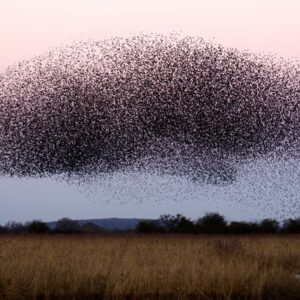Something about birds makes them a perfect fit with Halloween’s scary vibe. Think Edgar Allan Poe’s classic “The Raven” and Alfred Hitchcock’s chilling “The Birds.”
Nearly 50 years ago this fall, a small town had a huge problem on its hands, thanks to the winged critters. This is what happened when the blackbirds called on Kentucky.
Hopkinsville, Kentucky is a slice of classic Americana. Located a handful of miles above the Tennessee state line, a 152-year-old courthouse sits downtown with quaint little shops and stores, stately churches, and lovely old houses scattered nearby. It’s the kind of place folks are happy to call home.
Unfortunately, in the mid-1970s unwanted visitors decided to call it home, too.
Sometime in late October 1974, the skies around “Hoptown” (as the locals affectionately call it) grew dark. Not with clouds, but with birds. Blackbirds, to be specific. With large numbers of starlings and a healthy number of grackles and cowbirds along for good measure. When the sun went down each evening an estimated 5 to 7 million of them filled bare tree limbs, the air, and—well, basically any place they chose.
But this was no awe-inspiring natural wonder. Birds freely potty whenever and wherever they want. Hopkinsville suddenly found itself covered in millions of pounds of droppings. That created a serious health hazard. The invaders spent their days feasting on the grain farmers put out to feed their cattle. And that wasn’t the worst of it.
The birds eventually settled on a 30-acre clump of pine trees for their base of operations. Which put them in direct conflict with the U.S. Army, whose 101st Airborne Division was headquartered at the nearby sprawling Fort Campbell. Now plane and helicopter pilots had to contend with a serious flying threat.
Fed-up farmers and local citizens grabbed shotguns and blasted away at the feathered pests, but to little effect. Hopkinsville’s mayor called it “a pestilence and a scourge.” He wasn’t exaggerating. Veterinarians cautioned about gastroenteritis, which can kill infant pigs, while doctors warned humans to safeguard against histoplasmosis, an airborne disease that damages the lungs.
If all this sounds eerily reminiscent of “The Birds,” it was. Parents wouldn’t let their children play outdoors. They couldn’t anyway; their slides and swings were covered in white droppings. Just like the sidewalks, driveways, and car windshields.
By February, the birds had caused an estimated $2.6 million in damage (nearly $15 million in 2021 dollars). Desperate local officials issued an emergency SOS, and Uncle Sam responded. In early 1975, planes and choppers prepared to take off from Fort Campbell and douse the blackbirds and their buddies with Tergitol S-9, a biodegradable detergent that removes from their feather the protective oil that helps keeps them warm.
Then, just when a strategy was in place to counter the threat, two new characters entered the drama.
First, bureaucrats from the federal Council on Environmental Quality insisted the Army come up with an impact statement. That took several weeks and $20,000 (about $102,000 today) in time and paperwork. Then environmentalists got in on the act. The New York-based groups Society for Animal Rights and Citizens for Animals sued, seeking to stop what they called “a form of mass euthanasia.” (Hopkinsville’s mayor semi-seriously considered seeking a retaliatory injunction to prohibit Big Apple residents from killing stray rats.)
Nature eventually solved the problem with the calendar. When the weather warmed up in spring, the birds took off for greener pastures.
There was a similar episode in 2013 when millions of unwelcome fowl again showed up and caused yet another round of months-long misery.
They say birds of a feather flock together, and folks in Hopkinsville can attest to the saying’s accuracy. And then some. With leaves starting to fall off trees and temperatures beginning to grow nippy at night, you can’t blame them for keeping a nervous eye on the sky and their fingers crossed that the blackbirds don’t come calling again this year. To borrow from Poe, “Nevermore.”

